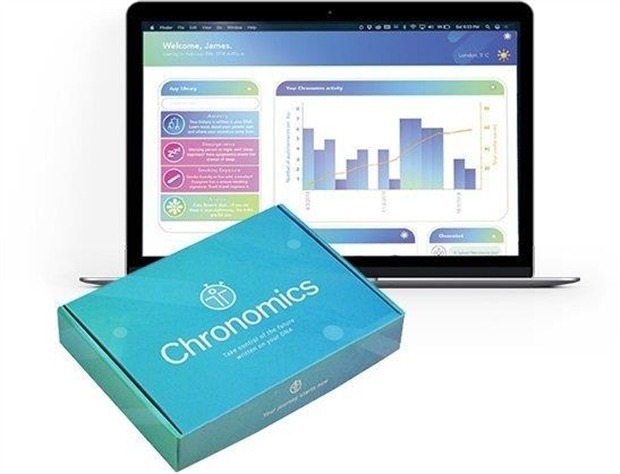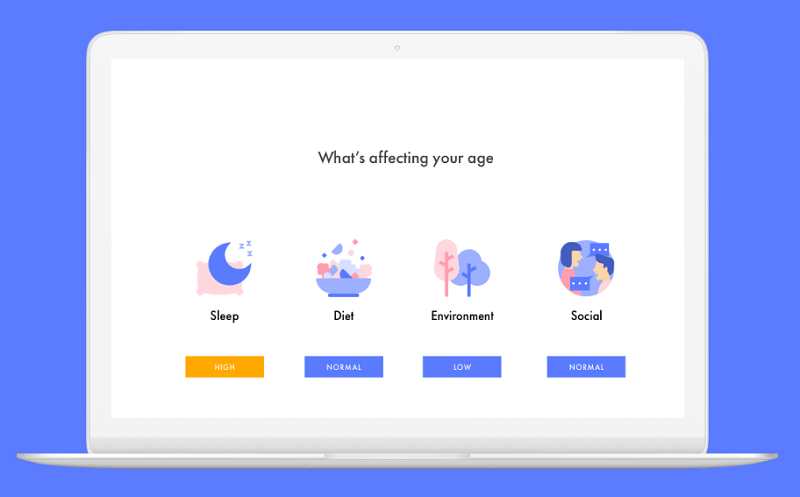Chronomics encourages its users to make lifestyle changes that significantly impacts their well-being and accelerates their age after analysing their saliva

Epigenetics controls the DNA and is affected by environmental and lifestyle changes (Credit: Cambridge Independent)
By tracking a broad spectrum of environmental and lifestyle factors – from what someone eats to their intake of air – Chronomics reads a person’s gene activity in order to calculate their biological age, which may which may not match their literal chronological age.
Known as epigenetics, these factors can eventually cause chemical modifications around the genes expressions – the way these cells communicate with one another – by turning them “on or off”.
CEO and founder Dr Tom Stubbs told NS Medical Devices the Chronomics group comprises scientists who strive to make healthcare more personalised and preventative using science and data to help people make informed choices about their health.
He said: “Epigenetics is the study of biological mechanisms that will switch genes on and off.
“Unlike an individual’s genome, which is fixed from birth and provides information about hair, eye colour, or hereditary diseases – a person’s epigenetic data can change over time, and is affected by environmental and lifestyle factors.
“By examining a saliva sample, our team has access to epigenetic data which reveals a person’s biological age [how old the body truly is at DNA level].
“It also gives the most accurate indication of a person’s metabolic rate, and can determine the effects of smoking, including passive smoking, on the body.”

What is Chronomics?
Dubbed the world’s first consumer epigenetics testing company, it combines AI, epigenetics research and next generation sequencing – AI computing technology – into a home saliva test kit and online digital platform to track users’ changing health and wellbeing.
Established in December 2017 by Cambridge graduates, the healthtech start-up, based in Norwich, UK, claims to extract 20 times the amount of data compared to other DNA tests on the market from a single saliva sample.
Called EpiHealth, a user’s epigenetic data can be analysed to determine how old their body thinks it is after users share their data with its team of healthcare professionals made up of two medical doctors and an epigeneticist.
Users subscribed to the service have access to the team, which recommends a personalised, holistic approach after simplifying the epigenetic results through the app.
Dr Stubbs, who graduated with a PhD in epigenetics from Cambridge University, explained: “Unlike a standard DNA test which looks at a person’s genome [fixed genetic information], an epigenetics test is repeatable.
“Because a person’s epigenetic data changes over time due to external influences, such as environmental factors, diet, alcohol consumption and pollution, our test equips people to take control of their health.”

The team interprets the data into personalised health insights to identify what lifestyle factors are directly affecting the user’s health at DNA level to enable users make informed lifestyle changes.
The insights from the data give people the ability to directly tackle many physical and mental disorders, including metabolic diseases, inflammation, mental well-being, chronic stress, fatigue and obesity maximising the benefits to their long-term health.
Some mental health factors can be based on a person’s environment, however this will have an internal effect on someone’s physical health.
“What’s more, we are unique as we measure an individual’s biological age, the most accurate predictor of age to date,” added Dr Stubbs.
“This offers insight into the likelihood of developing diseases such as cancer, dementia and heart disease.
“Studies of epigenetic indicators reveal that DNA methylation reduces with age, so over time, we lose control of our gene expression leading to increased inflammation as well as reduced cell and DNA repair.
“Learning how to mitigate the effects of this and essentially slow’ biological ageing will help people to live longer and healthier lives.”
Dr Stubbs was inspired by the effects of epigenetics on peoples’ life while he was conducting his PhD Professor Wolf Reik’s – a molecular biologist – lab at the Babraham Institute.
A closer look at some key negative lifestyle habits
The biggest and most drastic impact to epigenetic changes and age acceleration is smoke exposure, otherwise known as second hand smoke, with children being its biggest victims.
According to the Canadian Centre for Occupational Health and Safety, when a cigarette is smoked, about 85% of its smoke rises into the air, which contains higher levels of many carcinogens – carbon monoxide, nicotine and ammonia – than is inhaled by smokers.
This means people who are around smokers might have a higher risk of smoking-related disorders.
It is particularly dangerous for children, as they are at a higher risk of respiratory infections, asthma, bacterial meningitis and cot death.
Dr Stubbs said: “When it comes to passive smoking, it’s difficult to know just how much damage you’re doing to your body by inhaling cigarette smoke.
“However, our test helps to quantify this. We have tested individuals who, though they are not smokers themselves, have brought damage on their bodies by surrounding themselves with smokers.

“By giving people this information, they are equipped to make better choices about their lifestyle and have more control over their health and well-being.”
He explained the situation is similar for those whose diet has been detrimental to their health, and seeing evidence of damage in the form of the biological age gives them motivation to change their habits and live healthier lives.
He added: “Epigenetics throws open the door to a new world of possibilities.
“Our core platform already gives groundbreaking insight into some of the biggest risk factors for chronic and age related diseases, but we will expand the depth and range of health insights far beyond what is currently possible in the near future.”
